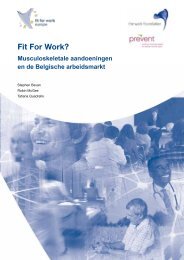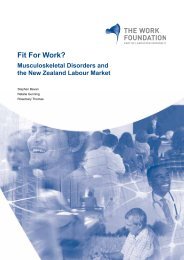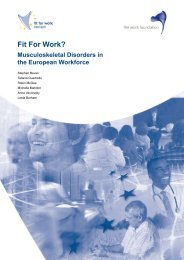FfW Bulgarian report (English language) - Fit for Work Europe
FfW Bulgarian report (English language) - Fit for Work Europe
FfW Bulgarian report (English language) - Fit for Work Europe
Create successful ePaper yourself
Turn your PDF publications into a flip-book with our unique Google optimized e-Paper software.
Interventions<br />
60<br />
This requires employers to think beyond their statutory duty to address health and safety risks,<br />
and to recognise that sickness absence management, effective return to work programmes<br />
and rehabilitation are underlying principles <strong>for</strong> effective management (Waddell and Burton,<br />
2006b). Much is dependent on raising awareness about how to manage the symptoms of<br />
MSDs amongst employees and their managers, and ensuring that the latter have the skills and<br />
confidence to support employees in work.<br />
4.5.3 Line managers<br />
Fear and anxiety associated with high workload, lack of autonomy and job insecurity can cause<br />
muscle tension – a main cause of MSDs. When accompanied with poor line management<br />
behaviour this association becomes more important (Tzenova and Velkova, 2008). With good<br />
line management these psychosocial factors could be eliminated or at least reduced, thus<br />
diminishing the risks of MSDs. The HSE Management Standards <strong>for</strong> Stress54 sets out helpful<br />
guidance to line managers on reducing the risk of stress.<br />
As well as the importance of line manager behaviour in preventing MSDs it is clear that the role<br />
of line managers in early intervention is also crucial, both in work retention and rehabilitation.<br />
Yet many line managers feel ill-equipped to manage long-term absence and incapacity. They<br />
may find aspects of mental ill-health or chronic incapacity awkward and embarrassing to talk<br />
about or confront, and are there<strong>for</strong>e unable to manage disclosure of ill health appropriately.<br />
Additionally, managers may be concerned about challenging or asking <strong>for</strong> more in<strong>for</strong>mation<br />
about GP sick notes, making home visits or telephoning staff at home <strong>for</strong> fear of being accused<br />
of harassment or falling foul of the law and landing themselves and their organisation in a<br />
tribunal. They are also ignorant of, or uncom<strong>for</strong>table with, the idea of rehabilitation. <strong>Bulgarian</strong><br />
legislation on health and safety at work is explicit about adapting the working conditions to the<br />
individual ‘eliminating and reducing their harmful effects on his/her health.’ By law, employers<br />
must there<strong>for</strong>e go beyond merely, ‘doing no harm’ to healthy employees and ensure that they<br />
adapt working conditions, through rehabilitation so that they do not exacerbate a pre-existing<br />
the health condition of an employee, regardless of whether it is work-related.<br />
Given that MSDs are the most common work-related health problem, and the importance of<br />
psychosocial factors in determining whether employees remain in work or return to it as soon as<br />
they can, managers need to have the skills to deal with staff who have these health problems.<br />
If managers do not intervene the costs to their organisation may be significant, particularly <strong>for</strong><br />
small and medium enterprises where the impact of absence on customer service, productivity<br />
and business per<strong>for</strong>mance will be greater.<br />
54 http://www.hse.gov.uk/stress/standards/<br />
<strong>Fit</strong> For <strong>Work</strong>?







